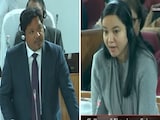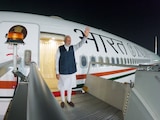The UK government tabled its proposal in Parliament on Thursday to double the period international migrants, including Indians, would be expected to wait before applying for indefinite leave to remain (ILR) under a new "earned settlement" model.
Home Secretary Shabana Mahmood told the House of Commons that settling in the UK was "not a right but a privilege", as she confirmed the current five-year automatic ILR route will be doubled for the majority of applicants.
Under the changes, low-paid workers will be subject to a 15-year wait for ILR and migrants accessing taxpayer-funded benefits would have to wait for as long as 20 years to be able to access settled status.
At the other end of the spectrum, skilled professionals employed in frontline sectors such as the National Health Service (NHS) and higher-earning entrepreneurs will have access to a fast-tracked route to ILR after five years or less. "To settle in this country forever is not a right, but a privilege, and it must be earned," Mahmood told MPs.
"I am replacing a broken immigration system with one that prioritises contribution, integration and respect for the British sense of fair play," she said. Mahmood, who described her family, who migrated to the UK in the 1960s and 1970s as "proud Kashmiris", said the changes are designed for a "fairer pathway" to settlement in a country where the pace and scale of migration have "not just been unprecedented but also destabilising".
"Between 2021 and 2024, we have seen net migration of an additional 2.6 million people. Around one in every 30 people in this country today arrived in these four years. This extraordinary open border experiment was the legacy of the last Conservative government," said the minister. The changes will apply to the over 2 million migrants who arrived in the UK from 2021, under a so-called "Boriswave" named after the then-prime minister Boris Johnson.
A consultation, running until February 2026, was launched by the Home Office alongside the parliamentary statement to finalise some of the transitional arrangements for borderline cases.
Overall, the changes are targeted at the estimated 1.6 million people qualifying for ILR between 2026 and 2030, with a peak of 450,000 expected to be hit in 2028. The consultation will also determine whether taxpayer-funded benefits are reserved for those who have achieved British citizenship, and applied separately a year after acquiring settled status.
Low-paid workers, such as the 616,000 people and their dependents who came on the now-discontinued Health and Social Care visas between 2022 and 2024, would be subject to a 15-year baseline wait before ILR. The Home Office said penalties will also be introduced for immigrants who exploit the system, with illegal migrants and visa overstayers having to wait up to 30 years to settle.
In contrast, doctors and nurses working in the NHS will be able to settle after five years and "to support economic growth, the brightest and best of international talent" could have their settlement fast-tracked, with some high earners and entrepreneurs able to stay after just three years.
While the exact norms will be laid out following the Home Office consultation early next year, the overarching intention is that anyone yet to be granted settlement status in the UK would be subject to a "contribution-based model" once the new rules are in force.
Under the proposals, migrants must have a clean criminal record if they wish to settle in the UK. Discounted timeframes will also be available based on levels of "integration", including speaking English to a high standard and volunteering within the community.
"The successful story of migration in Britain has always depended on two things. Firstly, that each wave of migrants becomes a part of our wider cultural life. And secondly, that they pay back to the country that has given them a home. This does not mean assimilation.
"We have built a multi-faith, multi-ethnic democracy that is pluralistic, grounded in tolerance towards difference. But it does demand contribution and integration," noted Mahmood. The intervention followed her parliamentary statement earlier this week on tightening the country's asylum system, which involves making refugee status temporary until a refugee's home country is deemed safe for return.
(Except for the headline, this story has not been edited by NDTV staff and is published from a syndicated feed.)















